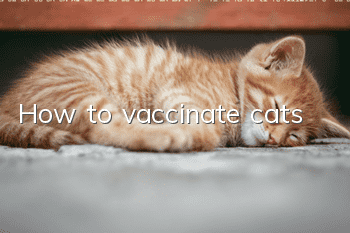How to vaccinate cats?

There are more and more parents raising cats and dogs in cities now, and many people don’t know how to vaccinate their pets. In fact, you can go to a pet hospital to vaccinate your cat. Generally, three injections are given in stages. Under normal circumstances, animals should be injected with two or more vaccines. One is to protect animals from infectious diseases (such as the six-combination vaccine for dogs, the three-combination vaccine for cats, rabbit plague vaccine, etc.), and the other is the rabies vaccine to protect people from getting rabies due to animal bites.
Immunization steps
The first injection of vaccine requires two or three times depending on age. In the future, animals should be vaccinated once a year for booster immunization. The earliest vaccination can be given two weeks after weaning of young animals. Vaccines are biological products and improper storage can cause vaccine failure. Therefore, animals should be vaccinated at a reputable and guaranteed animal hospital.
Cats and dogs start sucking breast milk when they are born. The first three days of colostrum are rich in transitional antibodies, which are enough to protect them until they are six to eight weeks old. When the antibodies in the little ones are at their lowest, they should be given timely preventive injections. Slowly The slow one will wake up its immune system and let it know these enemies; but it only knows it, and it is still in the "unarmed" stage. After the second injection, the immune system has awakened and begins to produce defensive weapons-antibodies. Although the antibodies worked very hard, the production was still not enough for use, so a third injection was given. This time it seemed like a booster shot, the immune system was fully activated and production was accelerated. The antibodies produced at this time are enough to be used for one year. This is the basic immunity of the little one.
Common types of vaccines
Currently, there are two common types of vaccines in China: imported triple vaccine and domestic feline plague vaccine. The triple vaccine can prevent feline distemper (panleukopenia), feline viral rhinotracheitis, and catarrhal enteritis. After injection, the immunity is valid for one year and should be immunized once a year.
The domestic cat distemper vaccine only protects against cat distemper. After injection, the immunity is valid for one year and should be immunized once a year. If you want to receive additional rabies vaccine, cats over three months old can be vaccinated. After injection, the immunity is valid for one year and should be immunized once a year. Feline triple vaccine is an imported feline distemper vaccine and is an internationally accepted product that prevents feline distemper, feline calicivirus infection and infectious rhinotracheitis. Immunization method: Cats over 2 months old need to be vaccinated (intramuscular injection) twice, with an interval of 2 to 3 weeks; after that, they need to be vaccinated once a year. This vaccine is currently clinically proven to be effective.
There are two types of rabies vaccines, domestic and imported, used to prevent the occurrence of rabies. Cats over 3 months old can be vaccinated. The protection period is 1 year and should be vaccinated once a year. From the clinical effect point of view, both imported and domestic rabies vaccines have better effects. Cat Distemper Vaccine The domestic feline distemper vaccine is a scientific research pilot product and is effective against feline distemper.A certain protection rate. It is an inactivated cell vaccine. Kittens aged 3 to 4 months can be vaccinated. The first vaccination should be administered intramuscularly twice, 4 weeks apart each time. Cats over 4 months old should be vaccinated once intramuscularly. The period is one year; thereafter, the injection is given once a year.
Precautions for vaccinations
Only healthy cats can be vaccinated. Under normal circumstances, the veterinarian should perform a clinical physical examination on the cat, including body temperature, respiration, heartbeat rate, physical examination and medical history inquiry.
The normal body temperature of kittens is 38°C ~ 38.5°C, and that of adult cats is around 38°C, but it should not exceed 38.7°C, unless individual cats have just come out of a stuffy car, and their body temperature may be slightly higher. The physical examination mainly observes whether there are eye secretions and nasal discharge, whether the color of oral mucosa is abnormal, whether there are proliferated blood vessels in the conjunctiva, whether there are vomiting, not eating, diarrhea, etc., whether there is a history of infectious diseases, and whether there is contact with sick cats. Pass.
After vaccination, there is a certain protection rate, but the protection rate is not 100%. This shows that when the immunity of vaccinated cats decreases, they may also contract infectious diseases if they come into contact with sick cats.
After injection of the vaccine, as the immune system begins to react, you may experience symptoms such as fever, mental deterioration, loss of appetite, drowsiness, etc. These are normal reactions and will usually recover on their own in 1-3 days
It takes about 7 days after vaccination to produce a certain amount of antibodies and provide a certain level of protection for cats. Cats that have just been vaccinated for 1-3 days are not in a safe period, and the effect of the vaccine is not fully reflected. Therefore, within one week after receiving the vaccine, you should avoid taking a bath or going out.
Cats that have been injected with serum need to be around 20 years old before they can be vaccinated. This is because the serum (containing certain antibodies) takes a certain amount of time to disappear from the body or drop below a certain level.
Cats in the incubation period of diseases (such as feline distemper) do not become ill at the time, but they will become ill within 1-7 days after vaccination and should be treated.
- How to stop cats from peeing on the bed?
- How to make a cat obedient?
- What does it mean when a cat sleeps on its back?
- Do British Shorthairs have tabby stripes?
- How to prevent your cat from running away? A must-read for cat owners!
- What are the daily habits of cats?
- Popular science on the diagnosis and treatment of feline joint disease, a must-read for cat owners!
- Are Siamese cats easy to raise?
- Can cats eat dog food?
- How long can a cat go without food?



